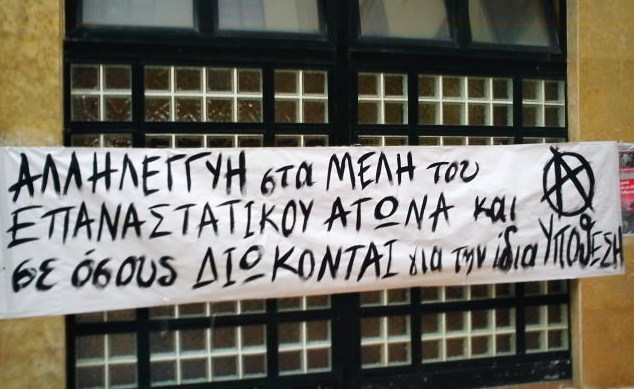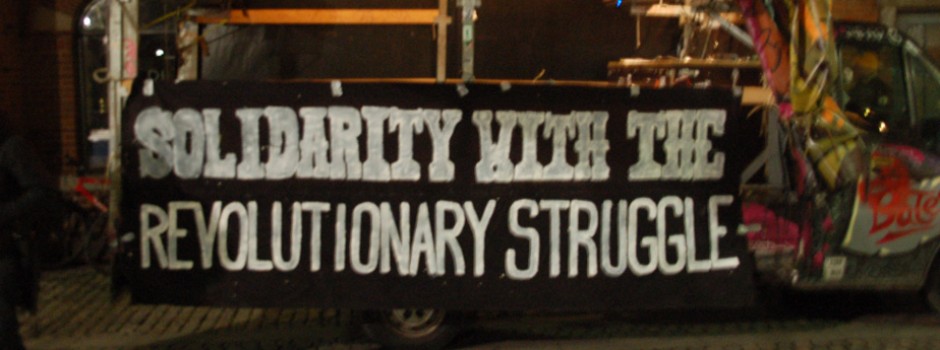Translated by boubourAs/Act for freedom now
 Solidarity with the Revolutionary Struggle members and the co-accused in the same case
Solidarity with the Revolutionary Struggle members and the co-accused in the same case
The second day with testimonies of defence witnesses for Ch.Kortesis began with historian and journalist Efstratios Bournazos, who stated he met Kortesis after his release and he gave him the impression of a structured person who defends his views with frankness.
His testimony, however, was with his scientific identity, that of a historian who is doing his doctorate dissertation on the “cold war” and emphasizing the use of the Media during it. As he mentioned, he can distinguish analogies between the era he studies and the modern era, which he summarized into four elements: the construction of the internal enemy, which is always observed in times of tension, the criminalization of friendly relations, the convictions not individually but based on the inclusion in general movement, i.e. based on belief, and the identification of the suspect with the guilty. The witness also referred to older cases of persecution which took place in the logic of criminalizing the belief and the crucial role the Media play in these cases.
Spiros Dapergolas first referred to his rather recent acquaintance with Kortesis, in the frames of action of the anarchist movement against heroin dealing in Exarhia, during 2009-2010. He spoke of a structured anarchist, clear in his opinions, capable to manage difficult situations with calmness and sobriety. The witness mainly stood at the opinions of the anarchist movement on armed struggle and the urban guerilla, pointing out that this form of political action is acceptable by the anarchists and that R.S. acted in the frames of anarchist perceptions and practices, this is why it has the solidarity of the movement. The same solidarity goes for those who are accused for the same reason and denied their participation in the RS. What I can tell you about Kortesis and the other comrades, concluded the witness, is that the state sets up cases and this has been proven many times in courts, not with the marginal form of doubts, but with the collapsing of cases which were set up. The same is taking place in this case.
Giorgos Kortesis, father of Christophoros, referred to his sons life, who followed his occupation (electrician), completing additional studies in electronics. Noteworthy is the description of the search which took place in his house. The prosecutor took a book, sat in the living room and started reading, while four cops of the Anti-terrorist force searched. Of them, only one (which they called lieutenant) was wearing gloves. The others just took various things, showed them to him and then put them all on a table, made a list of them, put them in boxes and left! He also revealed that, he himself, after his sons “detainment” immediately went to GADA (athens police headquarters), accompanied by a lawyer, but access was denied. Only at evelpidon courts, after 48 hours, did his lawyer manage to see Kortesis. Pantelis Nikolaidis, public worker, testified that he knows Kortesis since 1999, the period of protests against the war in Yugoslavia. He mentioned the democratic freedoms of the citizen, which are being affected, especially after the attack on the twin towers in New York, when there was a large incision, with the voting of the “anti-terrorist” laws, the formation of special courts etc. All this regime received a further push during the period of the Memorandum, during which those who fight are not potential suspects, but potential guilty.
Fani Dedousi is a very good friend of Ch.Kortesis for over 10 years and his flatmate in the house they rented together in Nea Filadelfia. While she was the tenant of the house which was presented as the safe-house with the guns, the police never bothered her, did not include her in the suspects, did not even call her for interrogation! On her own, with the help of a lawyer, she looked for her stuff which they had taken from the house. She was also insistent concerning the night which, according to the anti-terrorist force, Kortesis appears to participate in a “suspicious” gathering at the house of Stathopoulos, going in once and coming out twice (the famous gaffe of the anti-terrorist supervisor K.Papathanasakis) and leaving the second time with a car which was later found burnt out. As the witness testified, she herself picked up Kortesis from Stathopoulos’s house (it was very near theirs) with her car, went to Exarhia to two to shops (“Mikro cafe” and “Hassan cafe”) and around 3.30-4.00am returned home and went to bed. They woke up late in the afternoon of the next day and she then took Kortesis with her car to Stathopoulos’s house, in order for him to take his motorbike which he left there.
Ioannis Petrou, an old friend of the Kortesis family, spoke of the life of Christophoros and their everyday interactions (he is the owner of a cafe in Markopoulo, where Kortesis was born and raised), while Ioannis Douvikas, childhood friend of Christophoros, spoke about their friendship, their common activities, the social life of Kortesis in Markopoulo, his integration into the anarchist movement which was known to all of the small community of the area. He himself had “numerous times” visited Kortesis’s house in Filadelfia, which was presented as a safe house, and when he heard the Media, he was convinced even more about his friends innocence. I was convinced, he said, because I saw that they were presenting a different Christophoros from the one I knew so well.
University worker Panagiotis Politis stated that he does not belong to the anarchist movement and that he was approached by Kortesis defence team to testify as a witness. He only accepted when from the evidence of the indictment he was convinced that Kortesis was not guilty, otherwise he wouldn’t have accepted. He mentioned the set ups from the side of the police, reminding the case of the student with the green shoes, the case of the 49 students who were arrested in March 2007, the case of the four anarchists arrested and accused of a bank robbery in Evia, for them to be acquitted when it was proven that the car they allegedly carried out the robbery with was bought time after the robbery. The opinion that the police is always right is being de-constructed bit by bit, noted the witness.
The prosecutor asked the witness which evidence in the indictment made him come to the conclusion that Kortesis is innocent and he mentioned his presence at a friends house, that he was eating together with N.Maziotis and his fingerprint on a mobile object, which to his evaluation does not consist evidence of guilt.
Then the prosecutor asked him if he knew that they found a voice transformer at Kortesis house? The witness answered no and the prosecutor triumphantly announced that the witness did not study the indictment however came here to pretend to be a judge. The witness admitted being surprised by this and referred the prosecutor to Kortesis himself. And while the prosecutor leaned back on his seat satisfied, the revealing came from the defence, with the deposition of photos from the indictment: the infamous voice transformer was nothing but a kids toy, one of those which speak with the voices of various cartoon characters, which was actually in a box with a photo of Mickey Mouse! Apologizing, the prosecutor said that in the indictment he read that in Kortesis’s house they found a “voice transformer with a manual” and that all these months he has been trying to understand what this means exactly. And while hilarity prevailed in the court room, the prosecutor looks more carefully at the photo and continued to insist, thinking he hit a goldmine: Here it says “telephone voice changer”, he said in fluent English. Yes, but what is important is the possibility of use, replies the defence. Its one thing to have something for Halloween, and another thing to present it generally as a voice transformer, which could be used for other things also. Is there maybe a charge that someone from the RS called with Mickey Mouses voice? That’s when the prosecutor gave up.
The journalist of “Vima Science” magazine, Apostolos Galvadis testified that he was approached by the defence of Kortesis because in many publications he presented the scientific doubts that exist internationally about the method of identification with DNA. He referred to this scientific conflict, which has been branded internationally as DNA WARS and especially insisted on the statistic character of the method, which leaves possibilities “that maybe its not like that”.
Roza Kovani testified that she covered this case for “Epohi” and that she is convinced that Kortesis “should not be here”, while she also referred to the role played by the various “parrots” of the Media.
Iraklis Pozapalidis referred to his acquaintance and his common struggles with Ch.Kortesis, he spoke about the witch hunt and the fabricating of evidence by the police. The court’s decision, he stressed, will affect society in its totality and may stop the criminalization of friendly relations.
Giorgos Kalaitzidis referred to the targeting of the anarchist movement by the authority, because of its conflictual practise. The dogma which prevails in this conflict, he said, is that the state will snatch who they can snatch. Kortesis is at the front-line of conflict and this is why he is being targeted. But not in the RS. Whoever is at the front-line of conflict can be guilty of many things, but for the RS.
*The trial has been adjourned till Tuesday December 11th, 9am because of the absence of a large part of the defence advocates, who had other commitments in other court rooms. No sessions have taken place since October 31st because the days which were set for sessions coincided with the advocates mobilizations.
 Solidarity with the Revolutionary Struggle members and the co-accused in the same case
Solidarity with the Revolutionary Struggle members and the co-accused in the same case
 Solidarity with the Revolutionary Struggle members and the co-accused in the same case
Solidarity with the Revolutionary Struggle members and the co-accused in the same case